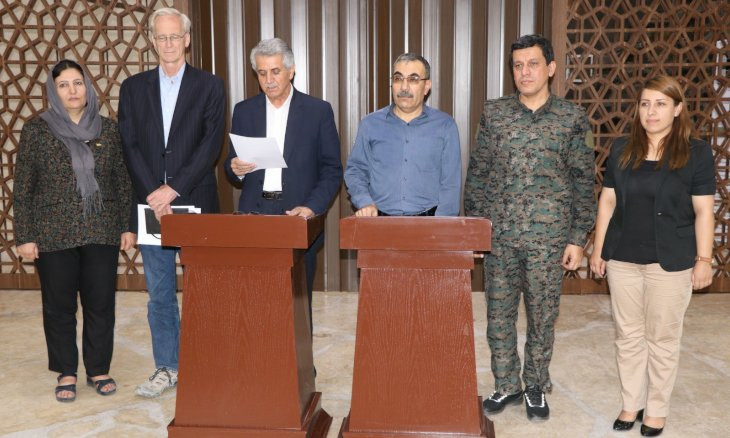‘Using the Turkish Lira in Syria is completing Ankara’s invasion’
The recent introduction of the Turkish Lira in towns of northern Syrian constitutes the final step in an assimilation policy enforced by Ankara in the region, journalist and Middle East expert Bereket Kar said. Reports have shown that cash and coins were brought in through the Turkish postal service (PTT).
Burcu Özkaya Günaydın / DUVAR
 Hayat Tahrir al-Sham 'executes Syrian Kurdish man after deportation from Turkey'
Hayat Tahrir al-Sham 'executes Syrian Kurdish man after deportation from Turkey'The recent introduction of the Turkish Lira in towns of northern Syrian constitutes the final step in an assimilation policy enforced by Ankara in the region, journalist and Middle East expert Bereket Kar said.
Following nine years of military conflict in northern Syria, the United States’s Caesar Act and its fiscal sanctions deepened the Syrian state’s financial crisis.
Today, Turkish Liras circulate in the markets of Afrin, Jarablus and El Bab. Reports have shown that cash and coins were brought in through the Turkish postal service (PTT). The Idlib district, controlled by jihadist group Hayat Tahrir al-Sham (HTS), mandated the use of the Turkish Lira.
Journalist Bereket Kar noted that the regions that now use the Turkish Lira were previously executively controlled by Ankara. “First they imposed the Turkish curriculum in schools. Then they established [Turk] Telekom. Turkish culture is being adopted and they want to complete the invasion with the currency,” Kar said.
While the fiscal sanctions against Syria were implemented in the framework of the Caesar Act, Kar noted that with the legislation, Washington closely monitors the country’s imports and exports. This implies that the U.S. would notice any Turkish intervention in the currency market.
Kar also underlined that Turkey had not opposed Washington’s harsh measures against the Syrian economy through the Caesar Act, though the legislation inflicts more harm on the people than the government of Bashar al-Assad. “The financial embargo on Syria worked in favour of Turkey’s goals of acquisition in the short run, and invasion in the long run,” Kar said.
Dramatic devaluation against the dollar
Kar also said that the Syrian lira devaluated dramatically against the dollar following the implementation of the Caesar Act. The dollar went from 900 liras per dollar to 3,200 liras per dollar. The Syrian lira thereby devaluated by 355 percent.
A ban on the dollar implemented by the Syrian government, which banned the sale of the currency anywhere but through the state, was partly responsible for that devaluation.
Moreover, the government buys dollars at a little over one third their value, paying a mere 1,200 liras on each dollar when the currency’s unit price on the black market is 3,200 liras.
 Rise in inflation caused by increased demand after COVID-19: Turkey's Central Bank
Rise in inflation caused by increased demand after COVID-19: Turkey's Central Bank“If you were to send $100 to a family in Idlib, Western Union would confiscate those $100 and pay the family at 1,200 liras on the dollar, and the recipient would be at a 200,000 liras loss,” Kar said. “So the public is really suffering.”
In fact, Kar said that the only regions of Syria that improved after the implementation of the Caesar Act were the jihadi-held ones. And for all of Ankara’s salvation narrative, Turkey has effectively been promoting American interests by bringing the Turkish Lira to the market.
“It brought the Turkish Lira to Syria to make the Syrian people feel like they are a part of Turkey,” the journalist maintained.
The Turkish Lira will enter Kurdish territory
The journalist further noted that Turkey’s move with the Turkish Lira would eventually spread to Kurdish-held territory like Rojava. He said that the former opposition Kurdish National Council (ENKS) that is now in a coalition with its rival Democratic Union Party (PYD), maintained close ties to Ankara.
Kar underlined that the ENKS had “remained silent at the invasion of Jarablus and Afrin,” and that their most recent agreement with the PYD was an attempt to “form Kurdish national union under the umbrella of the U.S. and Barzani,” referring to Kurdistan Regional Government (KRG) and its President Nechirvan Barzani and Prime Minister Masrour Barzani.
The journalist added that the ENKS and PYD would be participating in peace talks between opposing sides of the Syrian civil war in Geneva.
“The Kurdish regions use Syrian money for now but I believe these groups will bring the Turkish Lira into Kurdish territory,” Kar said.
 Rival Kurdish groups in Syria reach breakthrough agreement
Rival Kurdish groups in Syria reach breakthrough agreement
